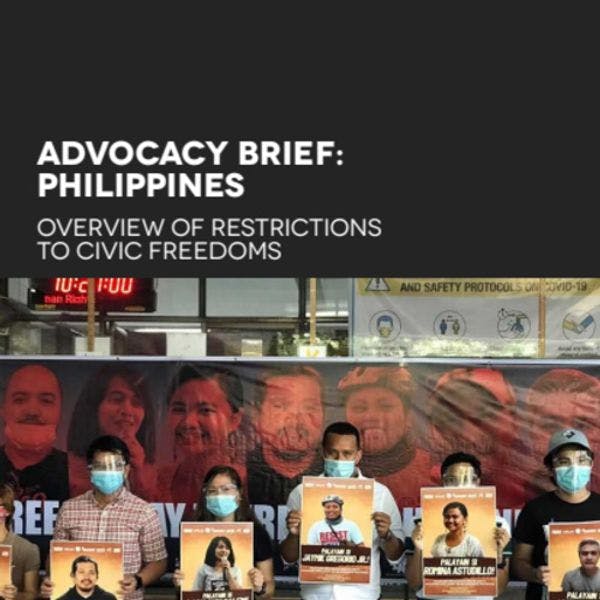Reseña de las restricciones a las libertades civiles en Filipinas
CIVICUS subraya los abusos a defensores de derechos humanos, abogades y periodistas por el gobierno filipino, incluyendo en el marco de la “guerra contra las drogas”. Más información, en inglés, está disponible abajo.
By CIVICUS
The current Philippines government under President Rodrigo Duterte has incrementally dismantled civic freedoms since it came to power in 2016. Human rights groups have documented systematic intimidation, attacks and vilification of civil society and activists, an increased crackdown on press freedoms, and the emerging prevalence of a pervasive culture of impunity.
In a damning report on the Philippines presented to the Human Rights Council in June 2020, the UN High Commissioner for Human Rights said that violations of human rights, including the widespread and systematic killing of thousands of alleged drug suspects, attacks on human rights activists and the vilification of dissent, were pervasive in the country, and accountability for these actions are virtually non-existent.
In an act of collective failure, the UN Human Rights Council responded with a profoundly weak resolution in October 2020 which failed to mandate an international investigation into these crimes. Instead, the resolution focused purely on technical cooperation and capacity-building which NGOs say, “has no realistic prospect of meaningful impact with a government that denies the true scale and severity of the human rights violations”
After nine months, on 24 July 2021, the Philippines government and the UN formalised a human rights programme which includes strengthening domestic investigation and accountability mechanisms; improved data gathering on alleged police violations; civic space and engagement with civil society and the Commission on Human Rights (CHR) to be implemented; strengthening the national mechanism for reporting and followup; a human rights based approach to counter-terrorism legislation and human rights-based approaches to drug control.
National and international human rights groups are sceptical about the programme’s prospects to improve human rights on the ground; instead, the programme appears more to be “window dressing to shamelessly evade accountability on human rights violations committed under this administration”. They have urged the UN Human Rights Council to launch an independent investigation into the police killings.
In a separate process, on 14 June 2021, the International Criminal Court (ICC) Prosecutor Fatou Bensouda requested judicial authorisation to proceed with an investigation into crimes committed in the Philippines from 1 November 2011 - the date the Philippines became an ICC member - until 16 March 2019.
According to the Prosecutor, there is a reasonable basis to believe that crimes against humanity have been committed in the context of the government of the Philippines ‘war on drugs’. She further added that available information indicates that members of the Philippine national police, and others acting in concert with them, have unlawfully killed between several thousand and tens of thousands of civilians during the period under investigation. The findings were welcomed by human rights groups and families of the victims.
On 15 September 2021, in a landmark development Pre-Trial Chamber I of the International Criminal Court granted the Prosecutor’s request to commence the investigation.
Within this context, this brief covers civic space violations documented by the CIVICUS Monitor following the October 2020 resolution.
